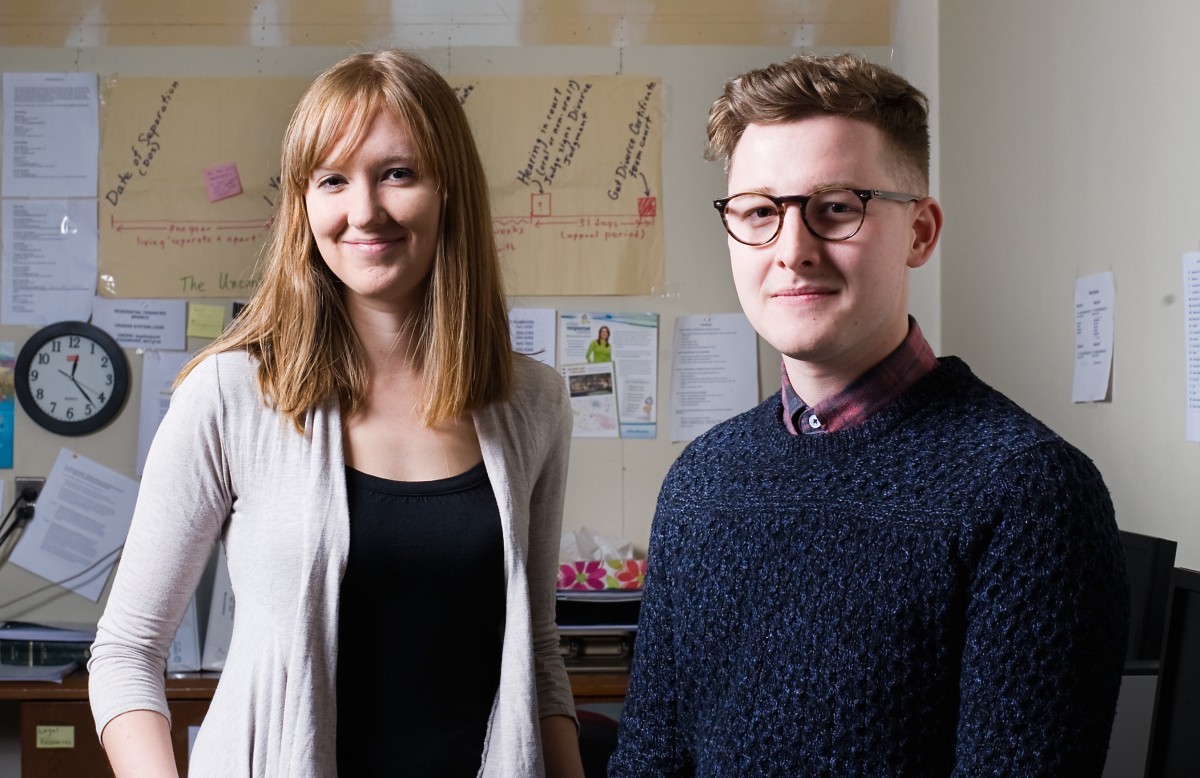
Kristin Kennedy and Josh Shaw / Photo: Katie Chalmers-Brooks
Education gets real
They’ve come to a storefront tucked away in the corner of Portage Place Shopping Centre looking for a bargain, but not on consumer goods.
The people lined up at the downtown mall on this Friday afternoon are waiting for free tips on how to navigate a complex legal system.
Run in part by University of Manitoba students, the Legal Help Centre opens its doors twice a week for an afternoon drop-in, offering information on legal problems, from divorce and child custody issues to landlord challenges and criminal matters.
The not-for-profit centre serves a neglected portion of the population who make too much money to be eligible for Legal Aid Manitoba yet too little to readily hire a lawyer. The current cash-strapped state of the Legal Aid system has meant a growing number of people no longer qualify for support, explains the Centre’s legal director and U of M alumna Hope Buset.
“There is this huge gap now. They’re really forced to deal with issues on their own,” Buset says.
Eager to help out is the Centre’s contingent of 20 U of M law students, who work alongside students from the university’s social work and inner city studies programs. Established three years ago, the mostly privately funded facility (which also partners with the University of Winnipeg) takes a holistic approach. The future lawyers answer questions about Manitoba’s legal processes while aspiring social workers provide referrals to other services as needed.
Half of the clients here earn an average annual household income of less than $20,000. A multi-disciplinary approach is key since poverty often goes hand-in-hand with mental health issues, notes Buset. “[The students] are dealing with real clients with real life issues,” she says. “It’s just this incredible place to learn.”
The law students can’t provide legal advice—since they’re not yet lawyers—but they can educate people about their rights and give them information so they can take as many steps as possible without having to hire a pro. Second-year law student Josh Shaw likens the need to a human rights issue.
“We provide a platform that can empower them in a way, which I think is really special,” says Shaw. “It’s very meaningful to see … how that esoteric law that we learn in school actually has relevance to society and specifically, people. It’s a very humanizing process which I think can be really rewarding and transforming for a law student.”
He’s especially interested in the unfair marginalization of individuals because of his own experience growing up different than his male classmates. “I’m a gay man so I’ve been bullied a lot throughout my life and sort of became aware of the social injustice of it,” says the 24-year-old.
Kristin Kennedy, a social work student at the Centre, first knew she wanted to combat prejudice when working with teens in the North End, helping them secure jobs and get away from gang influences.
“I saw a lot of untapped potential in the kids that they didn’t see,” says Kennedy.
Working the front lines at the Centre has the 22-year-old helping with housing, counselling, even managing threats of suicide. “Every client is so different,” she says, “and there is not just a Band-Aid solution.”
Read more stories from the summer2014 issue of TeachingLIFE here.
Research at the University of Manitoba is partially supported by funding from the Government of Canada Research Support Fund.






